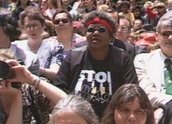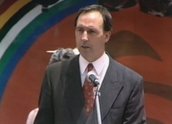


Keating Speech: The Redfern Address (1992)
Synopsis
On 10 December 1992, at the official opening of the United Nations International Year of the World’s Indigenous Peoples in Redfern Park New South Wales, the then Prime Minister the Honourable Paul J Keating made a landmark speech which influenced the relationship between the Australian state and the original Indigenous people and their descendents.
In the speech Keating challenges the established views of history held by many settler colonial Australians by outlining the outrages committed against Australia’s Indigenous peoples in the course of colonial takeover of their country. He called upon the Australian people to imagine if these outrages had happened to us – how would we feel?
He also praised the significant contribution that Indigenous people have made to the development of the nation and the cultural and social life of Australia. Finally, he underlines the Australian democratic passion for justice and he proposes a way forward for the decade.
Curator’s notes
Often referred to as Keating’s ‘Redfern Park Speech’ or the ‘Redfern Address’, it was given to a largely Aboriginal audience who were visibly and deeply moved by his words. This speech is notable for the tangible and passionate acceptance of responsibility for Aboriginal loss, devastation and trauma. The hardest hitting and most important part of his speech is when he puts the question ‘Imagine if it were us…?’
This is an ambitious and brave speech delivered at a time when there was significant division in Australian society around issues to do with Indigenous rights and justice for a colonised people. The rights of an Indigenous minority are not popular political debating points or the kind of policy development that is likely to win significant votes.
It is a speech that shows true leadership, that indicates a deep intellect and a highly moral and principled stand on very difficult issues. A speech that expresses sentiments with as much relevance today as in 1972, the beginning of the United Nations Decade of the World’s Indigenous Peoples.
Any notable landmark speech has an aftermath and the backlash that occurred after this one would plunge Australian politics and society into a time of deep division over the importance of human rights generally and the interpretation of Australia’s colonial history specifically. This speech outed the politics of history in Australian society and arguably heralded the History Wars – the debates we had to have, perhaps?
It is widely understood that Keating’s assertion of the collective responsibility of the present generations for the outrages of the past incensed many Australians, including the leader of the opposition at that time, John Howard. Keating’s aim was to shift the locus of Australian identity away from a British-centred past to a history grounded in the Australian experience, revitalising the movement toward an Australian republic that had cut all ties with Britain.
Paul John Keating (1944–), the 24th Prime Minister of Australia from 1991–96, was perhaps a most unlikely politician to demonstrate leadership in admitting the devastation that the colonial conquest has wrought on Australia’s Indigenous people. From a highly urban, working-class family in suburban Bankstown in the Sydney metropolitan area, his parliamentary career was marked by aggressive debate and hard-nosed policy development. When Treasurer and the driving force behind the micro-economic reforms of the Hawke Labor government (1983–91) in particular, he was arguably responsible for the 1990s recession that 'we had to have’, as he notoriously referred to it. He had also introduced mandatory detention for asylum seekers in 1992 and so was not notable for human rights concerns in his political career to date.
However, by 1992 he had enjoyed the opportunity to work closely with various Indigenous people on the national stage following the success of the Mabo v Queensland (1992) case that necessitated the development of the Native Title Act 1993 in the federal parliament (see Mabo: An Address to the Nation, 1993). He had also employed a notable historian as his speechwriter, Don Watson, who chronicled these years in a multiple prize-winning book Recollections of a Bleeding Heart (2002). He had also witnessed the recalcitrant prejudice and racism of many of the Australian people, the media and indeed members of Parliament, that erupted around the Mabo debates.
Whatever the possible influences on his stand, this speech, given on the occasion of the launch of the United Nations International Year of the World’s Indigenous Peoples in Redfern Park, is an extraordinary, landmark speech in the changing relationship of the Australian state to its Aboriginal and Torres Strait Islander peoples.
- Overview
- Curator’s notes
- Video 3 clips
- Principal credits
- Find a copy
- Make a comment
- Map
- Extras
- Add your review



